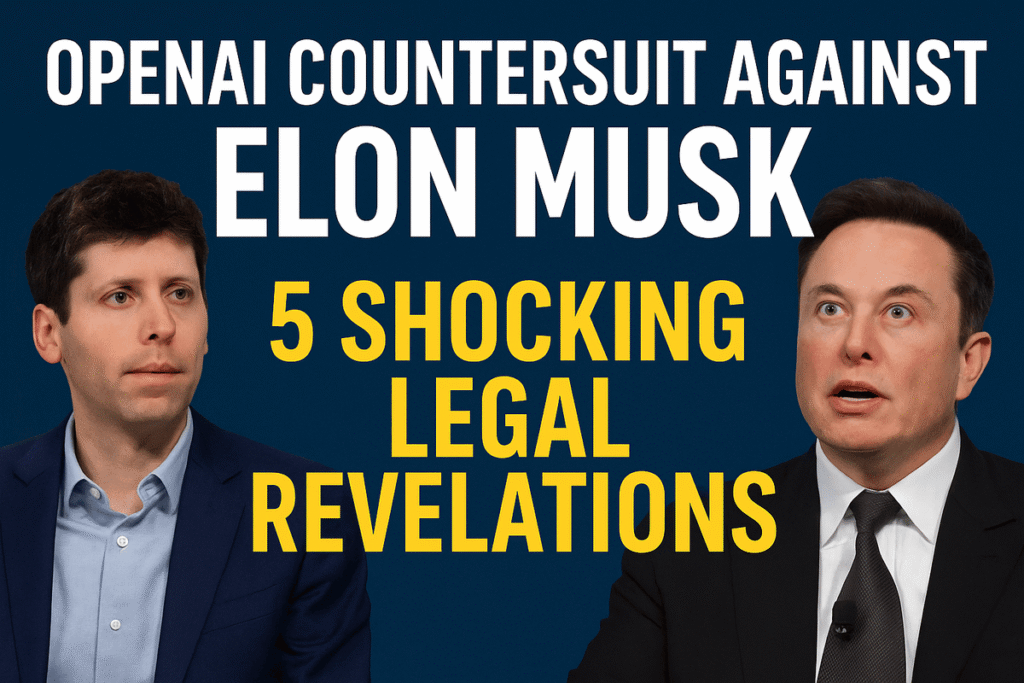Inside the Legal Battle Between OpenAI and Elon Musk: Allegations, Counterclaims, and the Fight Over AI’s Future
Introduction
In the fast-evolving world of artificial intelligence, few conflicts have captured as much attention as the OpenAI countersuit against Elon Musk. What began as a shared vision to develop artificial general intelligence (AGI) for the good of humanity has spiraled into a full-blown legal battle involving allegations of fraud, betrayal, and corporate interests.

At the heart of this dispute lies OpenAI’s controversial shift from a non-profit to a capped-profit organization — a decision that has drawn sharp criticism from its co-founder, Elon Musk. In return, OpenAI has accused Musk of engaging in fraudulent business practices and attempting a sham takeover bid worth nearly $100 billion.
This article takes a deep dive into the legal proceedings, explores the facts behind the headlines, and analyzes what this confrontation means for the future of AI, ethics, and tech leadership.
The Origin Story: OpenAI’s Founding and Mission
OpenAI was launched in December 2015 by leading figures in technology including Elon Musk, Sam Altman, Greg Brockman, and others. Its original charter laid out a compelling vision: to develop artificial intelligence that benefits all of humanity — free from corporate control and profit motives.
For the first few years, OpenAI functioned as a non-profit, publishing research openly and collaborating widely. However, by 2019, the demands of building AGI and acquiring computing resources led OpenAI to shift to a “capped-profit” model. This allowed it to raise capital while ensuring that profits were limited and aligned with its core mission.
This shift would later become the central issue in the OpenAI countersuit against Elon Musk.
Elon Musk’s Allegations: “Mission Betrayed”
In 2024, Musk filed a lawsuit claiming that OpenAI had strayed far from its founding principles. According to his complaint, the organization:
- Shifted its priorities from public benefit to private gain
- Became overly influenced by Microsoft, which invested over $13 billion in the company
- Developed GPT-4 and future models behind closed doors
- Abandoned its charter to serve all of humanity
Musk emphasized that OpenAI’s proprietary alignment with Microsoft contradicted its initial open-source, research-focused vision.
He also alleged that CEO Sam Altman and the board were operating in bad faith by placing profit over ethical development.
The OpenAI Countersuit Against Elon Musk
In response, OpenAI filed a countersuit in April 2025, marking a dramatic escalation in the legal standoff. The organization didn’t just reject Musk’s claims — it went a step further, accusing him of:
- Engaging in fraudulent business practices under California law
- Making a $97.4 billion “sham” takeover bid purely for media attention
- Leaking the bid to the press before it reached OpenAI’s board
- Harassing OpenAI executives and attempting to interfere with the company’s strategy
The OpenAI countersuit against Elon Musk argues that Musk’s actions were not only misleading but potentially unlawful.
Official Source:
Read OpenAI’s official legal position here:
OpenAI and Elon Musk – Official Statement
The $97.4 Billion Takeover Bid: Sham or Serious?
One of the most sensational elements of the case is the alleged $97.4 billion offer by a Musk-led consortium to acquire OpenAI earlier this year. OpenAI’s legal filing labels the bid as a publicity stunt, designed to create media buzz and destabilize the organization.
The claim is that:
- The offer was leaked prematurely to media outlets like Reuters and Bloomberg
- It was not backed by a formal funding plan
- It never reached OpenAI’s board for review
- It was part of a broader strategy to discredit the company’s leadership
Meanwhile, Musk’s legal team argues that the bid was serious and had financial backing. They allege that OpenAI is deflecting attention from its own internal contradictions.
External Coverage:
Court Proceedings and Trial Timeline
OpenAI has asked the court to include the countersuit in the expedited trial, emphasizing that Musk’s motion to delay or dismiss lacks factual basis. They argue that swift resolution is in the public interest given the growing influence of AI in global markets.
Elon Musk’s legal team has petitioned to delay the countersuit, hoping to split it from the main trial. The presiding judge is expected to make a final decision in late 2025, with the full trial scheduled for early 2026.
OpenAI is also requesting injunctive relief to prevent Musk from engaging in any further “unfair and unlawful” tactics against the company.
Strategic Revisions at OpenAI
In a notable shift, OpenAI recently dialed back its plan to fully remove control from its non-profit board, a move seen by some analysts as a response to public and legal scrutiny.
This revision keeps some non-profit oversight intact while still allowing the for-profit arm (OpenAI LP) to operate its commercial ventures like ChatGPT Enterprise and API access.
The move is likely strategic — bolstering OpenAI’s defense in the ongoing countersuit against Elon Musk by reinforcing its commitment to mission-first AI development.
Broader Implications for the AI Industry
This legal drama is about more than just two tech giants. It speaks to the philosophical and ethical tensions at the heart of AI development:
- Should AI be owned by corporations or humanity?
- How should non-profits raise funds without losing their soul?
- Can profit motives align with responsible AI development?
Whatever the court decides, the OpenAI vs. Elon Musk legal battle will leave a lasting mark on how society approaches AI governance, funding models, and public accountability.
Frequently Asked Questions (FAQs)
1. What is the OpenAI countersuit against Elon Musk?
The countersuit accuses Musk of fraudulent business practices and making a deceptive takeover bid. It is a legal response to Musk’s original lawsuit against OpenAI.
2. Why did Elon Musk sue OpenAI in the first place?
Musk sued OpenAI for allegedly abandoning its non-profit mission and favoring corporate profits through its partnership with Microsoft.
3. Is the $97.4 billion bid real or fake?
OpenAI claims it was a media stunt; Musk’s team says it was a serious offer. The court has yet to determine the validity.
4. What is OpenAI’s current business structure?
OpenAI operates as a capped-profit company under OpenAI LP, with oversight from a non-profit board to ensure alignment with its mission.
5. When is the trial expected?
The case, including the OpenAI countersuit against Elon Musk, is set to go to trial in early 2026.
Final Thoughts
The battle between OpenAI and Elon Musk is a defining moment for the tech industry. It touches on deep questions about trust, transparency, and the power of AI. Whether Musk succeeds in proving his allegations or OpenAI prevails with its countersuit, the outcome will shape how AI is governed for years to come.
For ongoing updates, check OpenAI’s official legal resources:
https://openai.com
Note: This article is based on information available as of May 30, 2025. For the latest updates on the legal proceedings between OpenAI and Elon Musk, please refer to official court documents and reputable news sources.
Read also : Realme GT7 & Realme GT7 Dream Edition: The Future of Flagship Smartphones at Your Fingertips

Hi, I’m Vishal Jadhav, tech writer and founder of All Trend Update. I’m passionate about exploring the latest technology trends, gadgets, and software, and sharing clear, accurate, and trustworthy content to help you stay informed in the fast-changing tech world. Based in Pune, I’m dedicated to providing valuable insights you can rely on.


